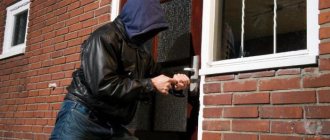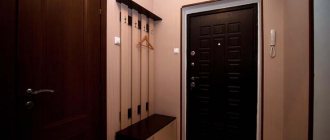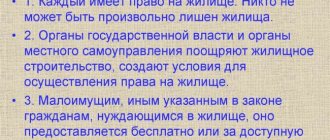Back in 1906, the inviolability of private property was established in the Russian Empire with the help of the Basic Laws. Since 1937, the Constitution of the RSFSR came into force, containing information about socialist property that belonged to the public.
But after the adoption of the new Constitution of 1993, the inviolability of the home is ensured, and the state acts as the guarantor of this right. Such data is contained in Part 1 of Art. 35 of the Constitution.
Concept
Scientists call inviolability differently - the freedom to exercise one’s own rights to any property. Typically, this concept is characterized as the protection of real estate from attacks by other persons, the state or companies. Therefore, it is prohibited to perform any actions that are not consistent with the will of the owner.
The inviolability of private property guarantees that any person can act autonomously and freely in relation to his property.
Free legal consultation
+8 800 100-61-94
The Constitution enshrines 3 basic properties relating to the ownership of any valuables, these include:
- Possession. The person who is the official owner of the property independently decides on the boundaries of ownership. He decides how to protect values, how to use them, and also in what ways to maintain an optimal state.
- Usage . Any citizen can buy or independently create any goods to obtain a certain benefit. Therefore, he independently decides in what ways he will apply the values.
- Order. Any property owned by a person by right of ownership can be gifted, inherited, sold, or given for temporary use to another person or company. In this case, the owner independently decides for how long and for what fee his benefits will be transferred.
Reference! If a citizen discovers that his rights related to private property are being violated, he can use the help of the police and also file a claim, and the court can decide to protect, replace or restore damaged valuables.
Explanations
Non-interference in the owner’s exercise of his rights presupposes the obligation of the state authorities to ensure a certain isolation of the subject and his property from other persons by enshrining prohibitions in legislation and determining the status of a person as an owner.
The protection of property and rights is carried out through the use by government agencies and public associations of a set of measures aimed at preventing infringement of the interests of subjects. The norms establish tools and mechanisms that ensure the elimination of the causes of violations and obstacles to the owners’ exercise of their legal capabilities. The protection of rights and property thus contributes to the establishment of normal, equal relations.
Protection of property from encroachment is carried out by government agencies, local government structures and their officials. It is aimed at restoring the violated or disputed rights of owners. Non-state institutions also take part in protecting property.
We suggest you read: Restoring a divorce certificate
Legal guarantees
It is the state that is represented as the guarantor of the protection of private property. For this purpose, special regulations have been adopted that are valid throughout the country.
Basic information is contained in the following documents:
- Article 35 of the Constitution. This regulatory act is represented by the main federal document, which establishes the rights and freedoms of Russians. Here the principles of ownership of any property are indicated.
- Article 2 of the Civil Code. It sets out the basic principles relating to private ownership.
- Article 12 of the Civil Code. Here the procedure is established on the basis of which the rights to certain values are determined. They can be obtained by a person after purchase, long-term use or restoration of an optimal state.
- Article 17 of the Universal Declaration of Human Rights. It indicates that a citizen can be the sole owner of property or own any benefits with other persons.
- Article 301 of the Civil Code. The real owner can return his valuables stolen or otherwise obtained illegally by another entity if he has evidence of a crime.
- Article 304 of the Civil Code. The provisions of this regulatory act are used if the use of property is associated with certain difficulties created by other persons or organizations.
- Article 1.2 of the Code of Administrative Offences. It provides for administrative penalties that apply to border violators or persons who encroach on other people's things in various ways.
- Article 2 of the Criminal Code. Criminal penalties for crimes related to the ownership of any property are indicated.
There are many more articles and provisions from the Code of Administrative Offenses that relate to the punishment of criminals and offenders trying to violate private law.
Inadmissibility of arbitrary seizure of property or disproportionate restriction of the rights of the owner
These elements of integrity are the most attractive for researchers.
The consolidation of certain restrictions in legislation may be determined by the need to ensure the stability of property relations and their development within the framework permitted by the Constitution and other regulations. In accordance with Art. 55 of the Basic Law, the rights of the owner can be limited only by federal legislation and only to the extent necessary to protect the constitutional system, health, morality, legitimate interests, freedoms of other entities, as well as to maintain the defense capability and security of the state.
There is no uniform approach to the definition of this concept in the legal literature. Some authors believe that the limitation of the owner’s rights consists in the withdrawal of certain powers. Others believe that the power that should be limited is not excluded from the content of rights. What does it mean? This means that the legal owner can exercise a subjective right to the extent that this is permissible under the existing restrictions.
Most common violations
There are many illegal actions by which citizens or companies violate the rights of the owner.
The most common violations and crimes include:
- illegal entry into a residential, commercial or warehouse premises, for which the lock is opened with a key or the front door is broken into, and criminals often climb into the premises through windows;
- being on someone else's territory without prior notice to the owner;
- signing documents for the owner, which leads to loss of ownership of the object;
- creating obstacles to the free use of property;
- denial of property rights recorded in Rosreestr;
- using technical or other means, the criminal obtains information about what is happening in an apartment or other premises, although he does not actually enter it, for example, he eavesdrops on citizens or monitors through a video camera;
- intrusion into the territory of residential property through deception, blackmail, threats or abuse of trust, for example, criminals often introduce themselves as police officers, housing department employees, gas workers or other persons whom people freely allow into the house;
- the use of violence to gain access to another's territory;
- a person uses his official status to enter an apartment without obtaining permission from the owner.
Attention! Even a representative of the local administration of the region does not have the right to enter the apartment without the permission of the residents to check the condition of municipal housing.
Ninth Arbitration Court of Appeal
Having disagreed with the decision, the defendant filed an appeal to the Ninth Arbitration Court of Appeal. The defendant also stated that the Moscow Arbitration Court did not properly notify him of the date, time and place of the court hearing, which is an absolute basis for canceling the decision of the court of first instance (clause 2, part 4, article 270 of the Arbitration Procedure Code of the Russian Federation). The Court of Appeal found that a violation of the rules on judicial notices had indeed occurred, overturned the decision of the lower court and proceeded to consider the case according to the rules of the court of first instance (ruling of the Ninth Arbitration Court of Appeal dated February 8, 2021 in case No. A40-130855/10).
Details of the decision: Resolution of the Ninth Arbitration Court of Appeal dated March 10, 2021 No. 09AP-54532/2015 in case No. A40-130855/10.
The applicant's demands: To cancel the decision of the court of first instance, proceed to the consideration of the civil case according to the rules of proceedings in the court of first instance and refuse to satisfy the demands for recognition of the ownership rights of the city of Moscow to non-residential premises.
The court decided: To cancel the decision of the court of first instance, proceed to the consideration of the civil case according to the rules of proceedings in the court of first instance and recognize the ownership of the city of Moscow to non-residential premises.
The Ninth Arbitration Court of Appeal found that the building in which the disputed non-residential premises are located is included in the List of objects related to municipal property (approved by resolution of the Moscow City Duma of May 20, 1998 No. 47), and is included in the Register of real estate objects located in property of the city of Moscow. Thus, the Court came to the conclusion that the disputed non-residential premises are municipal property (clause 1, clause 2 of Appendix No. 3 to Resolution of the Supreme Council of the Russian Federation of December 27, 1991 No. 3020-1). At the same time, rights to real estate that arose before January 29, 1998 are recognized as legally valid in the absence of their state registration (clause 1, article 6 of the Federal Law of July 21, 1997 No. 122-FZ “On state registration of rights to real estate and transactions with him”; hereinafter referred to as the law on state registration). As for the executed sale and purchase agreement, the Court indicated that this agreement violates the requirements of the law and infringes on the rights and protected interests of third parties, and is therefore void (clause 2 of Article 168 of the Civil Code of the Russian Federation).
Penalties for violation
There is a lot of information in the Code of Administrative Offenses and the Criminal Code regarding what penalties are applied to offenders and criminals who encroach on other people's property. Basic information is given in Art. 139 of the Criminal Code, since it lists punishments for persons who invaded someone else’s home. However, there are no sanctions for trespassing on commercial or corporate premises unless damage is caused.
Based on Art. 139 of the Criminal Code the following measures of influence on criminals are used:
- Illegal entry into residential premises without permission from residents or the owner. The offender is punished with a large fine, the amount of which is 40 thousand rubles. The judge may decide to impose a sanction that is equal to the convicted person’s salary for 3 months of work. Material punishment can be replaced by compulsory (360 hours) or correctional (up to 1 year) labor. In some cases, arrest for 3 months is applied.
- Entering a home using threats or open physical violence. Such a crime is considered more serious, so the fine increases to 200 thousand rubles. It can be replaced by the offender's earnings for 18 months of work. Judges often choose correctional (up to 2 years) or forced labor (up to 2 years) for violators. Sometimes a real prison sentence of 2 years is imposed.
- A person took advantage of his official position to enter an apartment or house without the owner’s consent. In such a situation, the most significant penalties are used. The fine varies from 100 to 300 thousand rubles, and can also be replaced by the criminal’s salary for a period of 1 to 2 years. Judges often choose penalties that include a ban on holding managerial positions for a period of 2 to 5 years, and a ban on work in some areas for a period of 2 to 5 years. If a criminal cannot pay a fine for various reasons, then forced labor is imposed, which lasts up to three years. In serious situations, an arrest of 4 months or a prison term of three years is chosen.
If the inviolability of the home is violated, then it is necessary to immediately call the police in order to bring the criminals to justice, and if any damage is caused to the living quarters or other property of citizens, they can demand moral and material compensation in court.
Article 35 of the Russian Constitution
Text Art.
35 of the Constitution of the Russian Federation in the current version for 2020: 1. The right of private property is protected by law.
2. Everyone has the right to own property, own, use and dispose of it, both individually and jointly with other persons.
3. No one can be deprived of his property except by a court decision. Forced alienation of property for state needs can only be carried out subject to prior and equivalent compensation.
4. The right of inheritance is guaranteed.
Examples of violations
Examples of violations of the inviolability of housing include:
- the man suspected that his neighbors were engaged in criminal activities, so through the neighboring balcony he installed a hidden camera next to the citizens' window, watching people and also eavesdropping on their conversations;
- the man suspected that his neighbors installed gas equipment without involving gas service workers, and since he worked in the local administration of the region, he demanded that the neighbors let him into the apartment, so he took advantage of his official position;
- The man's toilet was flooded by the upstairs neighbors, whose pipe had burst, so the embittered young man broke into the apartment using physical violence, hitting the woman and her child, and also breaking the mirror in the hallway.
Important! All of the above situations represent serious violations, and the exact punishment is determined by the judge, who first assesses the circumstances of the incident, and also studies in detail the materials collected by both parties.
Changes to the Tax Code[1]
The first novelty concerns the tax base for real estate. Now the law states that it is determined as the cadastral value as of January 1. Now the legislator has clarified that this is the cadastral value appearing in the Unified State Register of Real Estate as of January 1. This means that if you reduced the cost, for example, in November, but did not have time to enter it into the Unified State Register before January 1, then the tax is calculated based on the old cost.
From January 1, 2021, the legislator will begin to apply the principle of recalculation of taxes (including for real estate). Recalculation will be carried out at the request of the taxpayer for the last three years preceding the date of receipt of the notification from the Federal Tax Service about payment.
In addition, the state will introduce a dependence of the cadastral value on the qualitative and quantitative parameters of real estate. If the latter deteriorate, then the cost decreases, and when the characteristics improve, then, accordingly, the cost increases.
The legislator also paid attention to the problem of technical errors. He introduced a rule indicating that if an error is identified and corrected, a new cadastral value is applied from the date from which the erroneous value was in effect. It is clear that the corrected value can be either higher or lower than before.
And finally, starting from the new year, all men over 60 years old and women over 55 years old will receive standard benefits for paying property taxes.[2] This norm was adopted at the end of October 2021 and is associated with a change in the retirement age.
New “dacha” law
This regulatory act will also come into force on January 1 of next year.[3] He will leave only two forms of associations of gardeners and gardeners: gardening and vegetable gardening non-profit partnerships - (SNT and ONT). That is, dacha partnerships will become a thing of the past. To form SNT and ONT, the participation of at least seven owners will be required. The term for which the board will be elected will also change. It will not be two years, as is customary now, but five years.
The new law will allow the construction of only outbuildings on ONT land. But on the territory of SNT it will be possible to build a residential property and even register in it. True, there is one “but” here. The SNT land must be part of a zone in respect of which a town planning regulation has been approved, allowing capital construction. So not all gardeners will take advantage of this standard. By the way, if SNT is located on the land of populated areas, and residential buildings have already been built on each site, then it can generally become a homeowners’ association, or HOA.
In addition, it should be noted that the legislator has dramatically simplified the algorithm for converting a non-residential garden building into housing and vice versa.
The next interesting point is that the regulatory act introduces the rule of territorial subordination and categorically prohibits the operation of several SNT and ONT with common property and infrastructure in the same area.
The new law reduces the number of payments in SNT. The entry fee is completely waived. Only membership and target payments remain. At the same time, the legislator sharply limited the list of tasks for which SNT has the right to spend money. Now membership fees will be used exclusively for the maintenance of common property, payment for the services of resource supply companies and solid waste removal companies, landscaping of the territory, security of the village, payment of taxes, and so on.
The law also contains many other novelties, which, unfortunately, cannot be considered in one review article.
Changes to the Town Planning Code[4]
This year, the state made significant changes to the Civil Code of the Russian Federation. Most of them have already come into force, but some norms begin to apply only after the New Year. For example, from July provisions will come into force that significantly expand the list of design documentation for the construction of buildings and structures. It will contain new sections relating to fire, mechanical, and other safety, the procedure for connecting to utility networks in compliance with sanitary and epidemiological standards and environmental protection, and so on. In addition, the legislator clarified the procedure for preparing project documentation. Also in July 2021, regulations will come into force regulating the process and results of the examination of engineering surveys in much more detail.
IP inviolability of property
The principle of inviolability of property, both private and public, means ensuring that owners have the opportunity to use the property they own in their own interests, without fear of its arbitrary seizure or prohibition or restrictions on use.
This principle is a constitutional principle that has received sectoral specification in civil law. According to Part 3 of Art. 35 of the Constitution of the Russian Federation, no one can be deprived of their property except by a court decision.
Citizens’ opportunities to protect the inviolability of home and property can be expanded
It is proposed to specify the concept of a socially dangerous attack involving violence dangerous to the life of the defender or another person or with an immediate threat of such violence.
Thus, it is expected to establish a number of cases where the danger to life is obvious. Among the latter: The authors of the project associate the need to make the proposed changes with the fact that existing legislation and law enforcement practice in the relevant area make the danger of encroachment difficult for citizens to prove, and, without specifying obvious cases of such danger, they create excessive freedom of law enforcement discretion, which negatively affects the capabilities of citizens to protect one’s own rights and the consequences of such protection.
In addition, in the design standards Art.





